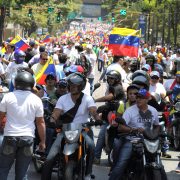Last month the world celebrated the birthday of the hashtag. As a writer, I am always looking for interesting and current topics to tackle. But this particular topic seemed completely insignificant to me. The symbol itself has existed for years. Why should I care about the anniversary of its repurposed use?
But upon further investigation, it became apparent to me that the advent of the hashtag should not simply be brushed off and dismissed as a silly pop culture trend. In fact, it actually answered many questions posed in F.A. Hayek’s essay The Use of Knowledge in Society.
The Hashtag is Born
Social media’s presence in our daily lives has reshaped the way our society exchanges information. But the fact that social media posts themselves are now able to be organized by a single “#” is quite remarkable. Now, all this decentralized knowledge is searchable on almost any social media platform.
Ten years ago, entrepreneur Chris Messina tweeted “#barcamp” from the then-obscure South by Southwest conference. By the end of 2007, it had been used on Twitter over 9,000 times. Today, over 125 million hashtags are used every day just on Twitter. With other social media platforms now utilizing this symbol, the total numbers are even grander.
But at its very core, the hashtag provides the means of connecting humanity with essential knowledge for better managing our lives – no matter where it comes from or where it ends up. The hashtag serves as a symbolic reminder of the remarkable information utopia that is emerging via technology in our time, and its existence portends vast increases in human well-being the future.
The Hayekian Roots of the Hashtag
In Hayek’s day, before the Internet, practical knowledge was less accessible than it is now. That knowledge, absent a means of accessing it, lives under conditions of radical dispersion and poses a potentially huge problem: How can society cumulate knowledge in a way that will protect it from centralization by one single entity?
FA Hayek explains this in “The Use of Knowledge in Society” by saying:
“The peculiar character of the problem of a rational economic order is determined precisely by the fact that the knowledge of the circumstances of which we must make use never exists in concentrated or integrated form but solely as the dispersed bits of incomplete and frequently contradictory knowledge which all the separate individuals possess.”
The knowledge necessary for the emergence and sustenance of social order cannot be concentrated by a state or authority figure. The attempt has already proven itself to be detrimental to societies throughout history.
Under feudalism, when travel was impossible, you only knew what you could extract from the small world around you, and this inhibited economic growth. As the move to the city advanced, so too did the knowledge base of humanity because we could have more contact with each other.
In the ages, before literacy was commonplace, theocracies capitalized on this lack of knowledge to keep their people subservient to their whims. If the people feared God’s judgment, but could not actually read what God had commanded of them, the government could use the text to its own advantage, interpreting it however it sees fit.
This problem is not unique to tyrannical theocracies but to all authoritarian regimes. Once information is concentrated to a select few, the whole of humanity misses out.
In the history of human progress, other technologies helped too. The printing press incentivized reading. This new skill shifted the culture and boosted humanity’s prospects. We could share more, learn more, upgrade what we know, and act on that knowledge to each other’s mutual benefit.
Thanks to the use of the hashtag on social media, posts are now categorized in a way that makes knowledge more easily accessible to individuals living all over the globe while still maintaining decentralization. The government isn’t controlling who tweets and who does not. That is left to the social media platforms themselves.
Ideas are not intellectual property, and as such belong to no one person in particular. That is the beauty of the hashtag. Once it is used on a particular post, that information is now easily searchable to all interested parties. Hayek may not have envisioned the hashtag, but he did understand the importance of the idea of congregating information in a central place, without having this information controlled by a state.
Hayek says:
“It is a problem of the utilization of knowledge which is not given to anyone in its totality…It is a dispute as to whether planning is to be done centrally, by one authority for the whole economic system, or is to be divided among many individuals.”
Iran’s Twitter Revolution
With the hashtag, individuals from all over the globe are organically sending knowledge and information out into the world by merely typing a symbol already in existence. But by doing so, all relevant posts have now been segregated by topic and are thus easily digestible to virtually everyone on the globe. In many ways, it is spontaneous order at its finest.
This knowledge as it exists on Twitter and other social media outlets today not only spreads intellectual information about a given topic. It goes further and spreads the human experience of a specific time or place associated with a hashtag. While Hayek probably never fathomed the hashtag, he did seem to grasp the importance of knowledge deriving from personal experience and eyewitness accounts.
“But a little reflection will show that there is beyond question a body of very important but unorganized knowledge which cannot possibly be called scientific in the sense of knowledge of general rules: the knowledge of the particular circumstances of time and place.”
Unless you were on the ground in Tehran during its 2009 elections, you would have had no idea what was going on during the country’s media blackout. However, thanks to Twitter and the use of hashtags, the oppressed citizenry was able to tell their stories, unique to a specific time and place, as Hayek says.
But because each Twitter user possessed their own unique knowledge of the situation relative to their experience, a wider range of information was able to be spread. Another phenomenon Hayek postulated without ever speculating the hashtag’s role in society:
“If it is fashionable today to minimize the importance of the knowledge of the particular circumstances of time and place, this is closely connected with the smaller importance which is now attached to change as such.”
Those tweeting from ground zero in Tehran may not have possessed skills that would usually warrant a demand for knowledge. They may not have been doctors or legal scholars. But they had their own experiences and by sharing their experiences, they brought about a change.
The government did not get away with blocking out all media. Videos of the atrocity were still shared. Students and other activists were still able to rally together because a simple hashtag helped them track down posts with location information. These Twitter users may not have known they were altering the course of history, but they undoubtedly were.
Spontaneous Order
Hashtags are the decentralized cooperation of many individuals. Each wanting to share their own opinions and knowledge with the world, they individually make the decision to actively participate in this sharing of ideas. This is another point made by Hayek in his essay:
“It is with respect to this that practically every individual has some advantage over all others because he possesses unique information of which beneficial use might be made, but of which use can be made only if the decisions depending on it are left to him or are made with his active coöperation.”
Social media sounds silly and almost dismissive when it comes to the exchange of information. With so much “fake” news out there it seems that a conglomerate of individuals would be the least likely place to seek knowledge.
But thanks to the hashtag, we now have a way to search specific topics and get a wide variety of viewpoints on one single matter. While it still may be up to the individual to discern what is true and what is simply sensationalism, the hashtag has given humankind the ability to organize information in what is arguably the most decentralized, spontaneous, and constantly evolving manner that has ever existed.












